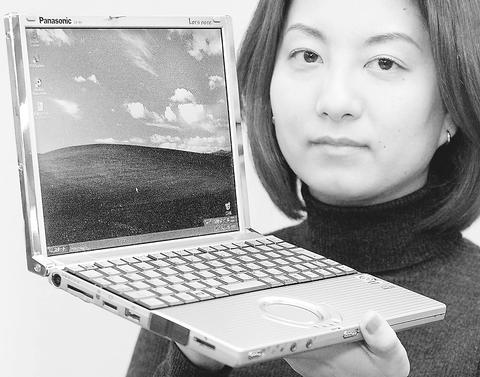Samsung Electronics Co and LG.Philips LCD Co, the two largest makers of flat-panel displays, say prices are starting to recoup last year's 45 percent decline.
Now, they are asking whether their Taiwanese rivals will spoil the party -- again.

PHOTO: AFP
"We hope they find some way not to repeat last year's situation," when prices fell by about half after six Taiwan firms opened factories, said Cho Yeong-dok, a top executive in Samsung Electronic's flat-panel division.
Samsung and LG.Philips, a venture between Europe's biggest and South Korea's No. 2 electronics firms, have long contended the world is flat. Their screens are thinner and lighter than cathode-ray tubes and are expected to be the standard for high-definition TVs, which some predict may be widespread by 2005.
Cho's comments, however, underline concern that companies in the US$10 billion industry are about to misjudge the market again.
South Korean firms may be just as much to blame: This year, Samsung and LG.Philips are opening so-called fifth-generation plants that can make as many as 16 laptop-size screens per glass sheet, compared with a maximum of six previously.
Samsung and LG.Philips say demand is overwhelming. Samsung can fill only 70 percent of the orders it's receiving these days, and is speeding up equipping its new plant which will churn out 30,000 of the larger glass sheets per month by October, Cho said.
Samsung forecasts demand will increase by between 72 percent and 74 percent this year. Supply, boosted by Samsung and a new LG.Philips plant that will make it the biggest producer by volume, will grow about 28 percent, the company estimated.
"If you don't have a fifth-generation plant coming on line this year you probably shouldn't bother," said Bruce Berkoff, LG.Philips' vice president of sales. "We are opening our factory right at the beginning of the shortage, which means we had to have the guts to invest during the glut."
The two South Korean companies and analysts agree that a screen shortage will persist until the second half of next year. The average sale price of a 15-inch screen will rise to about US$285 in the fourth quarter from a low of US$213 in the third quarter of 2001, according to UBS Warburg.
The worry: Taiwan plants now in the works will come on stream just as prices peak. Five of Taiwanese companies, including Chunghwa Picture Tubes Ltd (
"Taiwanese and Korean makers are planning to increase production," said Nobuaki Murayama, fund manager at Cigna International Investment Advisors Co. "I'm afraid we might see oversupply."
About 27 million screens will be made this year, a fraction of the 130 million personal computers forecast to be sold.
New markets -- the wider acceptance of videophones, for example -- may also boost demand for screens so thin that users can stack multiple units on a desk at the same time. High-definition televisions, which have up to five times better picture quality and sound, will also help.
Digital television also broadcasts in "widescreen" format, meaning TVs will need to be wider and larger than today's models.
"You can't imagine a 40-inch CRT -- it's too heavy," said Cho. "It takes two people to lift it. By 2005 we will all be buying LCD TVs."

SECURITY: As China is ‘reshaping’ Hong Kong’s population, Taiwan must raise the eligibility threshold for applications from Hong Kongers, Chiu Chui-cheng said When Hong Kong and Macau citizens apply for residency in Taiwan, it would be under a new category that includes a “national security observation period,” Mainland Affairs Council (MAC) Minister Chiu Chui-cheng (邱垂正) said yesterday. President William Lai (賴清德) on March 13 announced 17 strategies to counter China’s aggression toward Taiwan, including incorporating national security considerations into the review process for residency applications from Hong Kong and Macau citizens. The situation in Hong Kong is constantly changing, Chiu said to media yesterday on the sidelines of the Taipei Technology Run hosted by the Taipei Neihu Technology Park Development Association. With

CARROT AND STICK: While unrelenting in its military threats, China attracted nearly 40,000 Taiwanese to over 400 business events last year Nearly 40,000 Taiwanese last year joined industry events in China, such as conferences and trade fairs, supported by the Chinese government, a study showed yesterday, as Beijing ramps up a charm offensive toward Taipei alongside military pressure. China has long taken a carrot-and-stick approach to Taiwan, threatening it with the prospect of military action while reaching out to those it believes are amenable to Beijing’s point of view. Taiwanese security officials are wary of what they see as Beijing’s influence campaigns to sway public opinion after Taipei and Beijing gradually resumed travel links halted by the COVID-19 pandemic, but the scale of

A US Marine Corps regiment equipped with Naval Strike Missiles (NSM) is set to participate in the upcoming Balikatan 25 exercise in the Luzon Strait, marking the system’s first-ever deployment in the Philippines. US and Philippine officials have separately confirmed that the Navy Marine Expeditionary Ship Interdiction System (NMESIS) — the mobile launch platform for the Naval Strike Missile — would take part in the joint exercise. The missiles are being deployed to “a strategic first island chain chokepoint” in the waters between Taiwan proper and the Philippines, US-based Naval News reported. “The Luzon Strait and Bashi Channel represent a critical access

Pope Francis is be laid to rest on Saturday after lying in state for three days in St Peter’s Basilica, where the faithful are expected to flock to pay their respects to history’s first Latin American pontiff. The cardinals met yesterday in the Vatican’s synod hall to chart the next steps before a conclave begins to choose Francis’ successor, as condolences poured in from around the world. According to current norms, the conclave must begin between May 5 and 10. The cardinals set the funeral for Saturday at 10am in St Peter’s Square, to be celebrated by the dean of the College